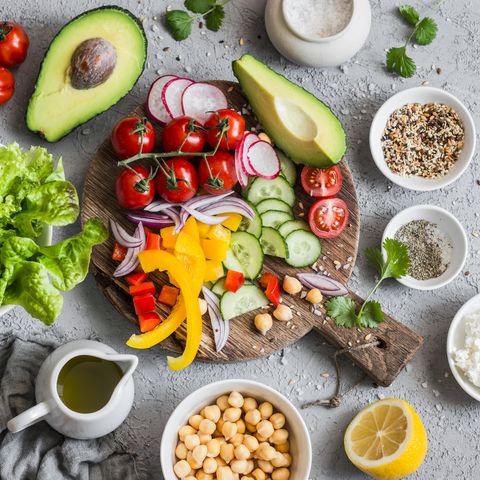
Beat Inflammation: A Plan for Glowing Skin
No one wants to grow old gracefully. Every day I see ads for anti-aging products, remedies, hydration cremes, uplifting masks, weight loss pills AARRRGGGHHHH !!!!!!!
The market is flooded with items to, as I put it " Bring Your Best Face Forward". Well, who wouldn't want to do that. I am 46 and would LOVE if there was just a pill, creme, serum that I could take to make me feel better, look younger, have more energy.. but realistically, there isn't any.
Yes.. this is coming from a woman who.. MAKES NATURAL SKIN CARE PRODUCTS !!!. This is also coming from a woman who knows that the only way to see the TRUE magic of natural skin care is to also Take Care of Yourself, which means healing from the inside out.. not the outside in.
In this edition of The Crunch Corner, I am going to discuss , what I think, is the biggest issue to health care AND the easiest to remedy.. INFLAMMATION.
What is Inflammation?
Think of inflammation as the body's natural response to protect itself against harm. There are two types of inflammation:
1. Acute ( good ) : arises after a cut or scrape in the skin, an infected ingrown nail, a sprained ankle, acute bronchitis, a sore throat, tonsillitis or appendicitis. It is short-term and the effects subside after a few days.
2. Chronic ( bad ): is long-term and occurs in “wear and tear” conditions, including osteoarthritis, and autoimmune diseases, such as lupus and rheumatoid arthritis, allergies, asthma, inflammatory bowel disease and Crohn’s disease.
Habitual or environmental factors, such as excess weight, poor diet, lack of exercise, stress, smoking, pollution, poor oral health and excessive alcohol consumption can also lead to chronic inflammation.
We are going to discuss Chronic Inflammation. this is the type that can cause long term damage and affects every aspect of our lives.
Chronic inflammation, sometimes called persistent, low-grade inflammation, happens when the body sends an inflammatory response to a perceived internal threat that does not require an inflammatory response. The white blood cells swarm, but have nothing to do and nowhere to go, and they sometimes eventually start attacking internal organs or other necessary tissues and cells.
How to spot the signs of chronic inflammation:
Chronic inflammation can reveal itself in a variety of way, but these signs are the most common in my experience.
- Depression
- Inflammation could affect your brain chemistry, causing changes in how you think and feel.
- Stomach Pains / Belly Fat
- Celiac disease, which causes gluten intolerance, and irritable bowel syndrome are also thought to be outward symptoms of ongoing inflammation inside your body.
- Fat cells in the abdomen churn out inflammatory chemicals—and the more belly fat you have, the more of these chemicals they create. In fact, cardiovascular medicine expert Peter Libby, MD, calls belly fat a “hotbed” of inflammation
- Fatigue
- Inflammation can affect the central nervous system, which includes your brain and spinal cord
- Inflamed cells are sick cells, and they can’t produce the energy you need to feel refreshed and invigorated. As a result, you feel fatigued even when you first get out of bed—and by afternoon, you’re exhausted
- High Blood Glucose Levels
- High blood sugar increases the numbers of inflammatory cytokines circulating in your blood. It also increases your levels of destructive molecules called advanced glycation end products (AGEs), which are pro-inflammatory
- Digestive Problems
- These can stem from a sick, inflamed, overly permeable gut—and a leaky gut that allows toxins to escape into your bloodstream is one of the leading cause of chronic, body-wide inflammation.
- Skin Problems
- This could be an external sign of internal fire. This is why there’s a powerful link between psoriasis and inflammatory conditions that manifest internally, including diabetes and cardiovascular disease.
Risks of Chronic Inflammation:
- Heart Disease
- Diabetes
- Obesity
- Lung Issues
- Bone Health
- Depression
- Cancer
- Anger disorders ( aggressive behavior )
Imagine if you kept stabbing yourself with splinters in the same spot, or kept training every single day without getting enough rest time to let your body repair between workouts. The inflammation would never go down, because you’d constantly be re-injuring yourself.
That’s exactly what happens if you keep irritating your gut lining (for example, with foods you’re sensitive to). The injury is constantly being repeated, three meals a day (or more, if you’re a snacker), 365 days a year.
How to Combat Inflammation ( You ARE What You Eat )
Anti-inflammatory diet and foods
Consuming omega-3 fatty acids is important. Anti-inflammatory food components, such as omega-3, protect the body against the possible damage caused by inflammation. Foods rich in Omega-3 consist of:
- Cold Water Fish rich in inflammation-fighting omega-3 fatty acids, which reduce C-reactive protein (CRP) and interleukin-6, two inflammatory proteins in your body. Tuna , Salmon
- Green Tea an antioxidant in green tea blocks the production of molecules that cause joint damage.
- Avocados contain “phytosterols, carotenoid antioxidants, omega 3 fatty acids and polyhydroxylated fatty alcohols” — compounds that can help reduce inflammation
- Broccoli and other cruciferous vegetables brussel sprouts, kale, cauliflower, bok choy, celery, leafy greens contain sulforaphane, which is associated with blocking enzymes that are linked to joint deterioration and, consequently, chronic inflammation
- Watermelon : Lycopene: a cellular inhibitor for various inflammatory processes. It also works as an antioxidant to neutralize free radicals
- Nuts : full of inflammation-fighting monounsaturated fat, protein and filling fiber, too – a bonus if you’re trying to lose a few pounds. Walnuts, pine nuts, pistachios and almonds.
- Onions: Onions are a good source of quercetin, which inhibits histamines known to cause inflammation
- Olive & Canola Oils: Researchers have found that oleocanthal, a key compound in extra virgin olive oil, has a significant impact on inflammation and helps reduce joint cartilage damage.
- Berries: Colorful foods such as blueberries, blackberries, cherries, strawberries
- Whole Grains & Seeds: Oatmeal, brown and wild rice, beans, barley and quinoa are excellent sources of whole grains have several antioxidant and anti-inflammatory compounds. They’re a low-cost source of fiber, protein, folic acid and minerals such as magnesium, iron, zinc and potassium (Chia Seeds, Flax Seeds)
- Certain Spices: ginger, rosemary, turmeric ( golden milk / see below), oregano, cayenne, clove & nutmeg
Foods to Avoid
Many things you currently consider to be "foods" are not. Instead, these items are processed, adulterated, refined, diluted, sweetened, salted, or changed in some way. Processed foods such as cookies, chips and other snacks can be high in unhealthy fats, which are linked with inflammation.
DAIRY
- WHAT??????? Milk is designed by nature to make calves gain weight quickly. And since we are not calves—or even babies any longer—our bodies do not require milk.
- dairy is a highly inflammatory food for most people. And more processing ("skimming") does not make it any healthier, only more inflammatory.
- Milk, soft cheeses, yogurt, butter
Refined Carbohydrates / Grains:
- have been stripped of other nutrients and have had their structure altered so they enter the bloodstream like an injection of sugar. This injection triggers the release of insulin which converts sugar into stored fat rather than energy, starving the brain of needed fuel.
- Pizza, white bread, crackers, pasta, pretzels, flour tortillas, breakfast cereals, bagels
Sugar
- Soda, snack bars, candy, baked sweets, coffee drinks
- The body can't process quickly enough can increase levels of pro-inflammatory messengers called cytokines
Salt
- causes fluid retention – one of many factors that can lead to high blood pressure.
Alcohol
- a drink a day can actually lower levels of the inflammatory biomarker C-reactive protein (CRP)
- too much alcohol actually has the opposite effect. That's because the process of breaking down alcohol generates toxic by-products which can damage liver cells, promote inflammation, and weaken the body's immune system
Tropical Fruits:
- No.. fruits are not bad.. BUT tropical fruits DO have a higher sugar content which can affect people id they already have health issues, like diabetes.
- Stay away from bananas, oranges, mangoes, papayas, and pineapples
Bad Fats / Fried Foods
- hydrogenated (or partially hydrogenated) oils,
- Vegetable Oils : soy, corn, safflower, sunflower
- High concentration of the inflammatory fat, omega-6, and are low in the anti-inflammatory fat, omega-3.
- Trans - Fat Foods: Margarine/shortening; baked goods like doughnuts, cookies, and muffins; non-dairy coffee creamers; frozen pizza; frosting
- Fast Foods
- no explanation needed.
Other sources of chronic inflammatory stress include:
- Psychological stress (a job you hate, money problems, social isolation, unemployment, caring for a loved one with a serious disease…)
- Excess Omega-6 fats ( soy and soy products, peanut oil, excess nuts) or inadequate Omega-3s.
- Sleep deprivation
All of these things are serious stressors, and if they’re constant presences in your life, they’re causing chronic inflammation. If the inflammation is in your gut, you might not see it the way you see a splinter on your finger, but it’s still there, gumming up the works.
Think of the way your whole joint swells up and gets stiff when you get a splinter in your knuckle: it just doesn’t work right. Now imagine your gut trying to work when it’s all inflamed like that, all the time. You might not see the problem, but it’s still there.
Summing it Up
When it’s a one-time thing, inflammation is nothing to worry about. In fact, it’s necessary; you wouldn’t be able to recover from injuries without it. If you have time to recover between bouts of inflammatory activity, it can even be beneficial (although not all inflammation is good for you: you won’t make your gut stronger by eating gluten the way you can make your legs stronger by doing squats).
But when it’s chronic, inflammation gets to be a serious problem in its own right. It makes you feel lousy, it stops your body from working as well as it could, and it can also contribute to other problems (like insulin resistance or metabolic syndrome) down the line.
The solution: don’t let your life fill up with inflammatory stressors!
- From a diet perspective, limit Omega-6 fats, excess sugar, and refined carbs. Get enough Omega-3s. (Preferably from actual fish, not fish oil supplements).
- Find some way to manage psychological and social stress so it isn’t preying on your mind.
- Give yourself plenty of rest time between workouts. Remember: workouts don’t make you stronger. Workouts make you weaker, because they injure your muscles. Recovery from workouts makes you stronger.
- Take care of your gut flora. Unhappy gut flora are an inflammation bomb waiting to happen.
- Get plenty of antioxidants from fresh fruits and vegetables (no need for antioxidant supplements; diet will do you just fine).
Am I going to stop eating bacon, cheese, donuts,milk, pasta, hamburgers etc?? No, but I do however consume those foods in moderation. If I "give something up" my Brain tells me I want it MORE.. so the lesson is everything in moderation. Avoid the foods that do cause you to to feel uncomfortable and INCREASE your intake of healthy foods , fruits and grains. It is about BALANCE and your body will thank you for it.
Feed your skin from the inside !!
Until next time.. Stay Crunchy
Essentially,
Christine
As always, please do your own research when making decision about the health and well-being of yourself and/or your family. This article does NOT solicit medical advise, but merely serves as an informational piece.
For more information http://www.medicalnewstoday.com/articles/248423.php









